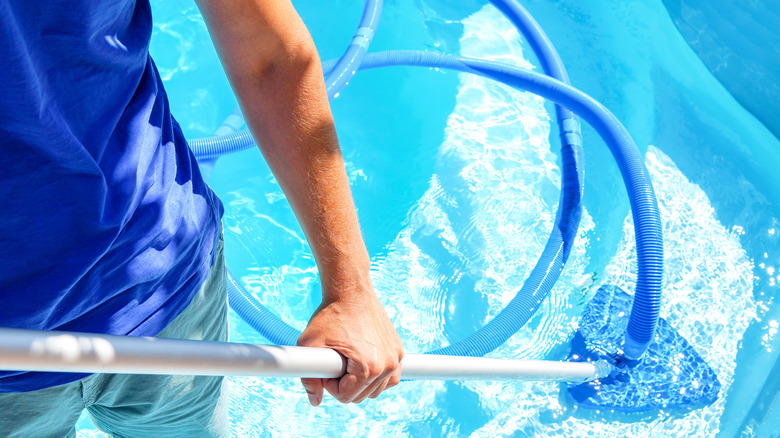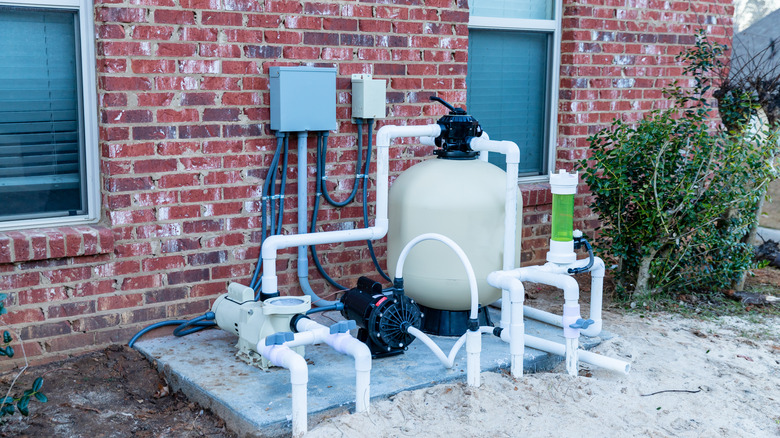5 Reasons Why You Might Regret Installing An In-Ground Pool
In-ground pools offer a fantastic, luxury amenity for many homeowners. The in-ground pool is an iconic feature of a home that leans heavily on outdoor entertaining and relaxation. Yet, this type of pool amenity leaves a lot to be desired. Even though in-ground pools provide a more personalized footprint for delivering this water feature to a homeowner's yard, there are some key benefits that above-ground pools create that simply can't be matched by in-ground installations (via Pool Pricer).
Every homeowner's needs and preferred style will be different, but there are some features that an in-ground pool brings to bear that are simply inferior to other alternatives. If you're thinking of installing a pool but are unsure about the right approach for your family, these five features that are lacking for in-ground installations might help you finalize the decision more comprehensively.
Continue reading to learn about a few reasons why the in-ground pool might not live up to the hype in your backyard.
In-ground pools create an immense maintenance burden
First of all, installing an in-ground pool will alter the way you maintain your home. In-ground pools are almost certainly larger than above-ground options, making them a larger feature that must be cared for on a routine basis. Homeowners will need to invest in pool chemicals, vacuuming and brushing equipment, and much more in order to keep their pool looking clean and providing a healthy and safe relaxation amenity for those in the home (via Swim University).
In-ground pools offer an incredible asset for a family that loves swimming and basking in the sun, but the amount of work that goes into taking care of this feature is astonishing. Aquanomics Pools reports that a typical pool should be cleaned two or three times per week. Depending on the size of your water feature, this can add up to be a substantial burden for someone who already maintains a busy schedule in their personal and work life. Not only does an in-ground pool command a considerable amount of time, but the expense of maintenance can make the value of this addition questionable for some homeowners who may not use the feature all that often. The truth is that an above-ground pool will cost less to install and maintain, and the time commitment required of you will be far smaller as well.
Higher energy costs come along with in-ground pools
In addition to the sizable maintenance cost and time commitment, in-ground pools must incorporate a pool pump that is run on a regular basis. Swimming Pool reports that a typical in-ground pool will need to have its pump run for at least eight hours per day in order to filter algae and bacteria out of the water. A pool that doesn't see this level of pump usage will quickly turn green and become a drain on the visual appeal of your yard. Similarly, if your pool has become filled with algae bloom, then your family and guests will be unlikely to swim in the future, making its presence something that adds no value to your lifestyle.
Before taking the plunge and building an in-ground pool in your backyard, it's important to understand that the cost to run this amenity is essentially non-negotiable in certain aspects of the feature. And the price tag associated with ongoing use of this type of pool versus an above-ground model will be higher. With the cost of energy prices continuing to rise (via U.S. Energy Information Administration), this is an important piece of information to keep in mind when deciding on any new pool installation.
They can be a safety hazard for small children
Another key fact about inground pools is their record when it comes to safety. Today, homeowners installing or renovating an in-ground pool must incorporate certain safety features that protect young children from falling in and potentially drowning. This will certainly raise the cost of the project by at least a small margin. However, it's possible to incorporate removable barriers rather than permanent ones, which can defeat the purpose altogether when it comes to providing ample safety for young family members.
The CDC notes that 4,000 Americans die in drowning accidents every year. An in-ground pool naturally places this water feature at a height just below ground level. They are dug into the ground and are therefore easy to simply walk into. An above-ground pool, on the other hand, may be placed directly on the ground or dug partially into it. Either way, above-ground models rise above ground level and can be immensely hard for a young child to accidentally fall into. Regardless of the type of pool at your home, safety must remain a priority. However, it's worth noting that in-ground pools are likely far more dangerous than the above-ground alternative unless additional precautions are taken and constantly observed.
In-ground pools can be problematic when you want to sell your home
Real Simple notes that an in-ground pool may or may not improve the resale value of your property. Generally speaking, homeowners want to incorporate modernizations and renovations that will improve their quality of life and their resale value at the same time. But depending on where you live, a pool may not provide this second facet of a quality home improvement project. For those living in colder, northern regions, a pool might not be a feature that buyers are looking for on a routine basis, whereas home buyers in Florida or Arizona might be searching specifically for properties that include a pool.
Unlike other features in the home footprint, a pool is something that only adds value if the person buying it is interested in this additional amenity. An above-ground pool can be removed and taken with you (or simply disposed of). Yet, an in-ground pool becomes a part of the property's layout. For those living in parts of the country where pools aren't heavily featured, selling your home with the addition of a pool might be difficult because you'll be hoping to enjoy a markup in consideration with this addition whereas buyers may not be lining up to get their hands on it.
You may be on the hook for increased property taxes
Lastly, when the value of your home changes substantially, you become liable for increased property taxes. Property taxes are assessed as a percentage of your home's value — and vary by state. If you improve upon your home substantially, then you're likely to see a dramatically increased tax bill in the next tax year. Generally speaking, minor home improvements will improve your quality of life and the potential sale price of this asset in the future. However, they aren't likely to attract the attention of tax assessors.
With large-scale home improvement projects like the addition of an in-ground pool, you will need to get permits for many tasks involved with the work. The larger the wave you make with any home improvement opportunity, the more likely it is that you'll see a new property value assessment come down the line and augment your property tax obligation (see tax obligations by state according to Rocket Mortgage for more individualized data).





